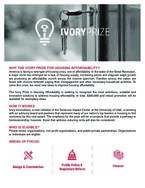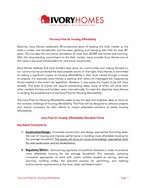Found 1058 resources.
0
0
0
Using administrative data from Massachusetts, this study analyzes the health care use and Medicaid expenditures of families who experienced one or more homeless episodes between 2008 and 2015 to investigate how health care use is related to emergency housing experiences.
Topics: Asthma, Child welfare, Depression, Health, Homelessness, Housing, Low-income, Medicaid / Medicare, Metrics, Pre-natal, Research
0
0
0
Housing providers and counselors in urban, suburban, and rural areas can help refugees and resettlement agencies navigate challenging rental markets, understand the evidence about how housing and neighborhoods matter, and prepare for long-term success as a renter or owner.
Topics: Community development, Housing, Immigrants, Research, Stability
0
0
0

Nationally, resources for providing families with housing assistance are inadequate. DC is piloting a new approach, the DC Flexible Rent Subsidy Program (DC Flex), to test whether shallow (smaller than the average subsidy, over a defined period) and flexible subsidies can help more families maintain affordable, adequate housing.
Topics: Cost effectiveness, East Coast, Housing, Low-income, Research, Stability
0
0
0
Some places lift children out of poverty. Others trap them there. Now cities are trying to do something about the difference.
Topics: Child welfare, CLPHA, Community development, Criminal justice, Housing, Low-income, Metrics, Mobility, Racial inequalities, Research, Stability, Youth
0
1
1
Neighborhoods are constantly changing as residents come and go, businesses open and close, and properties go up or come down. No place is the same for long. When community changes are widespread or stark, the conversation shifts from change to “gentrification,” the definition of which is often subject to debate. At its heart, gentrification happens when a low-income area that has experienced disinvestment attracts new economic investments and higher-income residents. But the benefits of these changes can be overshadowed by the perpetuation of disadvantage.
Topics: Community development, Housing, Low-income, Mobility, Racial inequalities
0
0
0

For the Omaha refugee families removed from an apartment complex where city inspectors found gas leaks, vermin and other code violations, there were glimmers of progress Friday amid the uncertainty.
Topics: Health, Housing, Immigrants, Low-income, Midwest, Safety
0
0
0

In 17 years, the Family Independence Initiative has enrolled 3,000 families — four people per household on average — and is operating in 14 different cities across the country. Now the initiative is making a move into 10 neighborhoods across Chicago. With a $2.6 million backing from Google.org and the City of Chicago, the organization hopes to combat poverty and improve the quality of life for 1,000 families on the South and West sides by giving money directly to them while also strengthening their social ties.
Topics: Asset building, Low-income, Midwest, Workforce development
0
0
0

An estimated half of all college students struggle with food insecurity, even at elite flagship universities like the University of California, Berkeley, and selective private schools like Northwestern University. Former foster youth, L.G.B.T. students and students of color are at substantially increased risk. Food insecurity is strongly linked to lower graduation rates.
Topics: Low-income, Post-secondary, Youth
0
0
0

A children’s hospital in Columbus, Ohio, is trying to treat a difficult patient: Its own struggling neighborhood.
Topics: Affordable Care Act, Child welfare, Health, Housing, Low-income, Midwest, Partnerships
0
1
1
About 20 percent of adults in sheltered homeless families have a disability, compared with 9 percent of all US adults, yet few studies have addressed the intersection of disability and housing instability. A recent study explored the relationship between disabilities and Supplemental Security Income (SSI)/Social Security Disability Insurance (SSDI) income that homeless families reported when they entered emergency shelters, as well as later outcomes, such as housing stability, self-sufficiency, and food insecurity. It also examined how housing interventions affect SSI/SSDI income receipt.
Topics: Disabilities, Homelessness, Housing, Low-income, Research, Stability
0
0
0
Many social issues stem from a history of unstable, unaffordable, and poor-quality housing. Research shows that housing is the first rung on the ladder to economic opportunity for individuals and that a person’s access to opportunity is intrinsically linked with that of the community at large. As the gap between rents and incomes widens, it is critical that professionals in fields outside housing—including health, education, and economic development, among others—understand its central importance.
Topics: Community development, Education, Health, Housing, Low-income, Metrics, Partnerships, Research
0
1
1
HOW IT WORKS
Ivory Innovations, a new initiative of the Sorenson Impact Center at the University of Utah, is working with an advisory board and partners that represent many of our nation’s top leaders in housing to find nominees for this new award. The emphasis for the prize will be on projects that provide a pathway to homeownership; however, those that address reducing rents will also be considered.
WHO IS ELIGIBLE?
Private-sector organizations, non-profit organizations, and public-private partnerships. Organizations or individuals are eligible.
Topics: Funding, Housing, Stability
0
0
0
The Ivory Prize for Housing Affordability seeks to tap the best and brightest ideas to focus on the complex challenge of housing affordability. The Prize will be designed to advance projects and reward innovators for their efforts to impact adoptable solutions to tackle housing affordability.
Topics: Funding, Housing, Stability
0
0
0

Harvey — and its record rains — is long gone. But life may never be the same for thousands of children who spent the past school year — and will spend the one that just began — without a home. Their schools have been rebuilt. Their lives have not.
Topics: Child welfare, Education, Homelessness, Housing, Low-income
0
0
0
As the devastating effects of the opioid crisis continue, a growing body of research supports the efficacy and safety of this sort of medication-assisted treatment (also called MAT) for drug recovery, when combined with psychotherapy. But the use of any of these medicines — a list that includes methadone and naltrexone, as well as Suboxone — remains frowned upon by most operators of sober living houses.
Topics: Health, Housing, Substance abuse
0
1
1

San Francisco health officials working to end HIV infections and deaths in The City are zeroing in on the homeless population, where there’s been an uptick in new cases.
Topics: Health, Homelessness, Legislation & Policy, Low-income, Preventative care, West Coast
0
0
0
Trauma-Informed Care (TIC) is a holistic approach to providing services, distinct from a clinical treatment model. It has its roots in the Vietnam era, and evolved through the turn of the century, with a particular focus on female survivors of physical and sexual violence.
Topics: Health, Mental health, Partnerships, Stability
0
0
0
This report compares the profile of the schools accessible to HUD-assisted and LIHTC households in 2016 to the profile of those accessible to other similar households within the same state or metropolitan area. In brief, we find that families receiving all four major types of federal housing assistance lived near lower performing and higher poverty schools than other poor families with children as well as other renters with children.
Topics: Education, Housing, Low-income, Mobility, Racial inequalities, Research, Youth
0
0
0
The study finds three out of five adults across the U.S. had at least one adverse experience in their childhood, such as divorce, a parent's death, physical or emotional abuse, or a family member's incarceration or substance abuse problem. A quarter of adults have at least three such experiences in childhood, which – according to other research — increases their risk for most common chronic diseases, from heart disease and cancer to depression and substance abuse.
Topics: Child welfare, Depression, Early childhood, Low-income, Mental health, Racial inequalities, Research
0
0
0
The King County Housing Authority (KCHA), in partnership with the Highline School District and the nonprofit social service organization Neighborhood House, launched the Student and Family Stability Initiative (SFSI) pilot program in 2013 to provide housing and employment supports to homeless and unstably housed families with children enrolled in Highline elementary schools. In 2016, KCHA contracted with the Urban Institute (Urban) to conduct a process and outcome evaluation of the program’s first three pilot years. This evaluation documents how SFSI works, who it serves, and how well it...
Topics: Attendance, Dual-generation, Education, Family engagement, Housing, Low-income, Pacific Northwest, Partnerships, Place-based, Research, Stability, Workforce development, Youth
0
0
0
Understanding the characteristics of infants and toddlers in our states and communities is an important first step for supporting children’s development during their most critical years. Making more detailed and comprehensive information available on the young children living in different communities can help stakeholders more strategically develop and target key services such as child care, home visiting, or other services for young children. For example, knowing how many young children live in low-income families and what share have parents working full time can help states and localities...
Topics: Early childhood, East Coast, Health, Legislation & Policy, Midwest, South, West Coast
0
0
0
Maternal depression is a widespread public health concern that has been linked to negative impacts on child development and health outcomes. Within home visiting programs serving low-income women, maternal depression rates have been measured as high as 61 percent. Home visitors are uniquely positioned to help address maternal depression and can play an important role in conducting screenings and providing referrals to community resources. This brief summarizes the existing research to illustrate the importance of addressing maternal depression in home visiting programs, and outlines three...
Topics: Early childhood, Health, Homelessness, Low-income, Mental health
0
0
0
Evidence shows that investing in children today can decrease poverty for the next generation of adults. Host Justin Milner speaks with researchers Heather Hahn and Cary Lou about the federal government’s current spending on kids, future projections for this spending, and what that means for America’s children.
Topics: Child welfare, Early childhood, Education, Funding, Legislation & Policy, Research, Youth
0
0
0
About MDRC’s “Evidence First” Podcast Series:
Policymakers talk about solutions, but which ones really work? Join Katie Beal, MDRC’s External Affairs Associate, as she talks with experts about the best evidence available on education and social programs that serve low-income people.
Topics: Education, Funding, Legislation & Policy, Low-income, Post-secondary, Workforce development, Youth
0
1
1

A body of evidence points to a link between living in areas of concentrated poverty and health.
Topics: Child welfare, Community development, Health, Housing, Low-income, Medicaid / Medicare, Metrics, Partnerships, Racial inequalities, Safety
 Shared by Housing Is
on Aug 20, 2018
Shared by Housing Is
on Aug 20, 2018 

